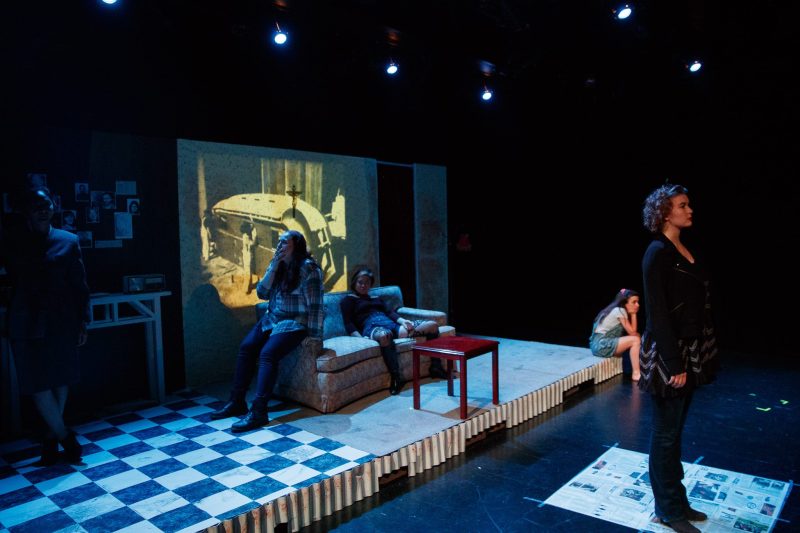My experience with “In Volution” began before I even set foot inside the Nitery. The energy of the lobby could only be characterized as electric. Following one of the most tumultuous election seasons and shocking results in history, the audience members eagerly awaiting admittance into the theater viewed this play in a new light. The story centralized the Ronald Reagan electoral victories that occurred in the eighties, democratic decisions that, like the current decision, sent shockwaves throughout the nation. With this in mind, the play adopted a new, acute sense of relevancy, placing pressure on its actors that nobody could have predicted. Perhaps it was this relevancy which fueled each actor on stage — or perhaps it was the incredibly moving content marked by some of the most intricate, dynamic relationships I’ve ever seen. Regardless, each actor culminated their own individual talents to build an ensemble that was tragic, raw, and shocking.
“In Volution,” written by Madelaine Bixler and directed by Bixler and Elliot Bomboy, is predominantly narrated by April, a young and caustic pessimist reflecting back on her journey into adolescence in 1980s San Bernardino, CA. Adult April, played by Fiona Maguire ‘19, watches as her life unfolds as she reconciles with some of the most troubling memories of her past. She captivates in her strained retelling of those bittersweet, often just bitter, moments, peppered by monologues between each changing scene.
Young April, portrayed by Davis Leonard ‘19, immediately brings warmth and innocence to a home ravished by the hand of poverty. As April faces the struggle of her own journey into womanhood, we are exposed to the volatile relationship between April and her mother, played by Abigail Flowers ‘17. Maguire balances someone who is emotionally drained and someone who still remains steadfast in their own self-reliance. Leonard displays the tragedy of watching a the withering of a child’s innocence. And Flowers captures our love and sympathy, performing all the necessary actions to make us throw this trust away, yet still commanding care from us, as viewers, for her well-being. The trust lives on.
The other great dynamic relationship of the show is that of Cynthia, a fresh force in the FBI portrayed by Raquel Orendain Shrestha ‘17, and her supervisor, Tom, played by Publio Adrianza ‘17. While a typical boss-employee dynamic is initially established, the characters’ dark familial pasts create a third player in their relationship. Cynthia initially comes across as cold and unfeeling, and Tom is protective in an almost-peculiar fashion. The purposefully lethargic unravelling of their former lives picks away at each individual until the audience is exposed to a new and raw duality to both characters. Shrestha faces the challenge of portraying a believable individual hardened to life, and she accomplishes this with a certain air of grace that commands respect.
The third major relationship includes Tania, a sex worker hooked into life on the streets, and her ever-loyal client-turned-confidant Abel, who, much like a drug abuser, struggles with his own views of what he should be (the straight-laced Catholic) and what he wants (Tania’s love, attention, and world). Tania, portrayed by Hope G. Yi ‘17, enchants with their diction and body language. They leave the audience in want of her never-ending layers of her distorted past to be peeled back, exposed to be devoured. She’s seen and experienced life on the streets for far too long, and thus comes across as difficult to crack; however, the light arrives with Abel (David Alban Hidalgo ‘17), who dismantles Tania’s tough exterior, just enough to allow a peer into the inner workings of her mind. This duo, simply put, takes us through the complexities of love that we throw ourselves into, rooting for the pair to bring out the best in one another.
Apart from the tremendous skill put forth by each actor, one is immediately struck by both the decrepit set and the use of multimedia. Both elements work together and compliment one another in order to transport the viewer to the appropriate time period. In this case, we lifted from our seats in Nitery Theater and landed in the confined, congested spaces of both a trailer and an FBI office. Additionally, the implementation of video projected onto the back wall of the set, which graced our presence throughout the entire show, served to supplement the reality of the plot. Together, the audience and characters were able to witness video of Reagan’s inauguration, a variety of 1980s commercials, and pressing news reports which allowed the setting to be seen, heard, and felt with greater depth.
While “In Volution” gives us a variety of compelling relationships, the most powerful one of all was each character’s own struggle between obsession and resolution. Each character has been to hell and back in their own personal way and chooses to manifest this struggle in a variety of different ways. The play delves into bleak and dark topics, so where does the hope lie? How is the audience able to leave the theater satisfied and moved beyond words, especially in a time of such confusion and fear? The answer lies in endurance. By the end of the show, each woman is standing, broken, scarred, and battered, yet not silenced. We, as an audience, are reminded that in times of struggle, we cannot let this struggle define who we are. Each woman finds themselves in a new, foreign place in their lives, facing equally new and foreign challenges; however, each woman pushes on, moves on, and carries on with her own sense of individuality intact. This reminds us as an audience of the durability of the human spirit. While this the end of the show isn’t necessarily optimistic, the action of carrying on, facing your demons, and coming to terms with oneself is able to point us in that direction.
Contact Elizabeth Gerson at egerson ‘at’ stanford.edu.
